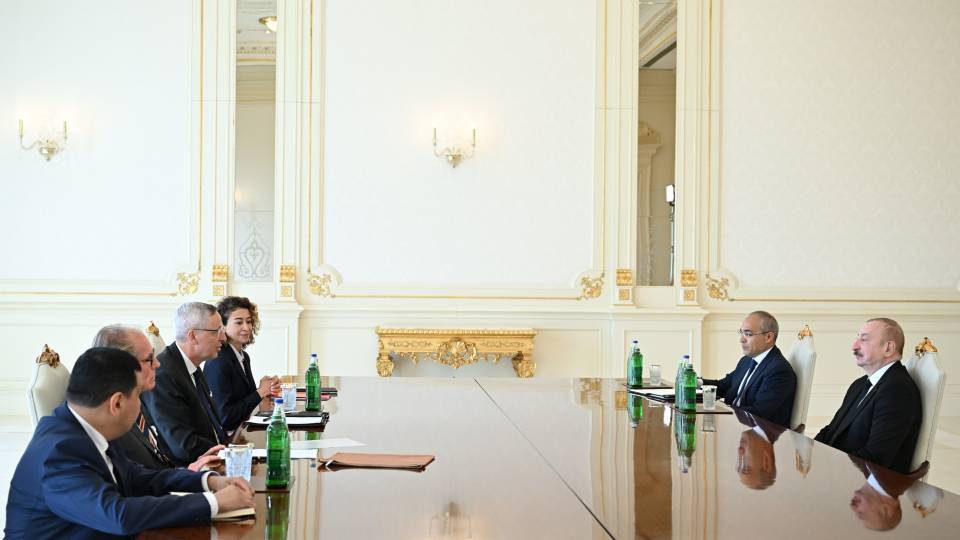13:30
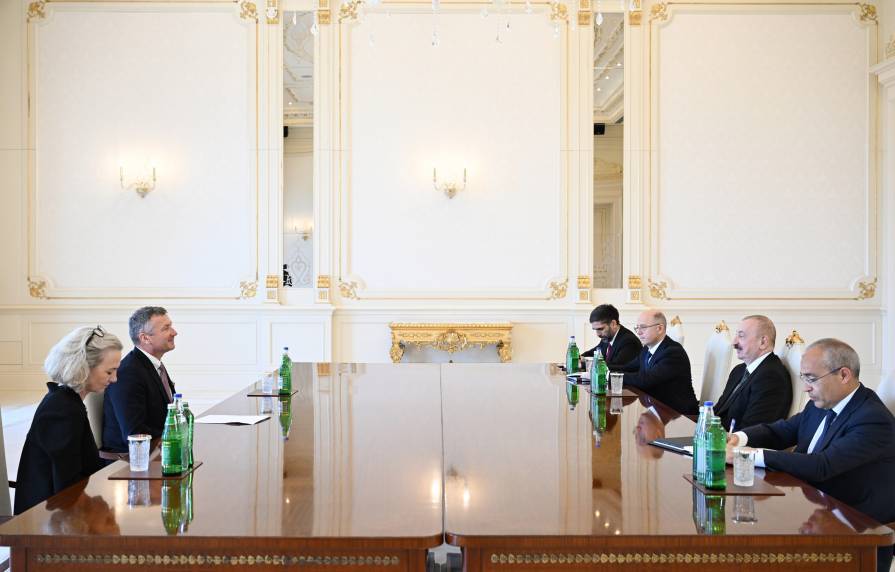
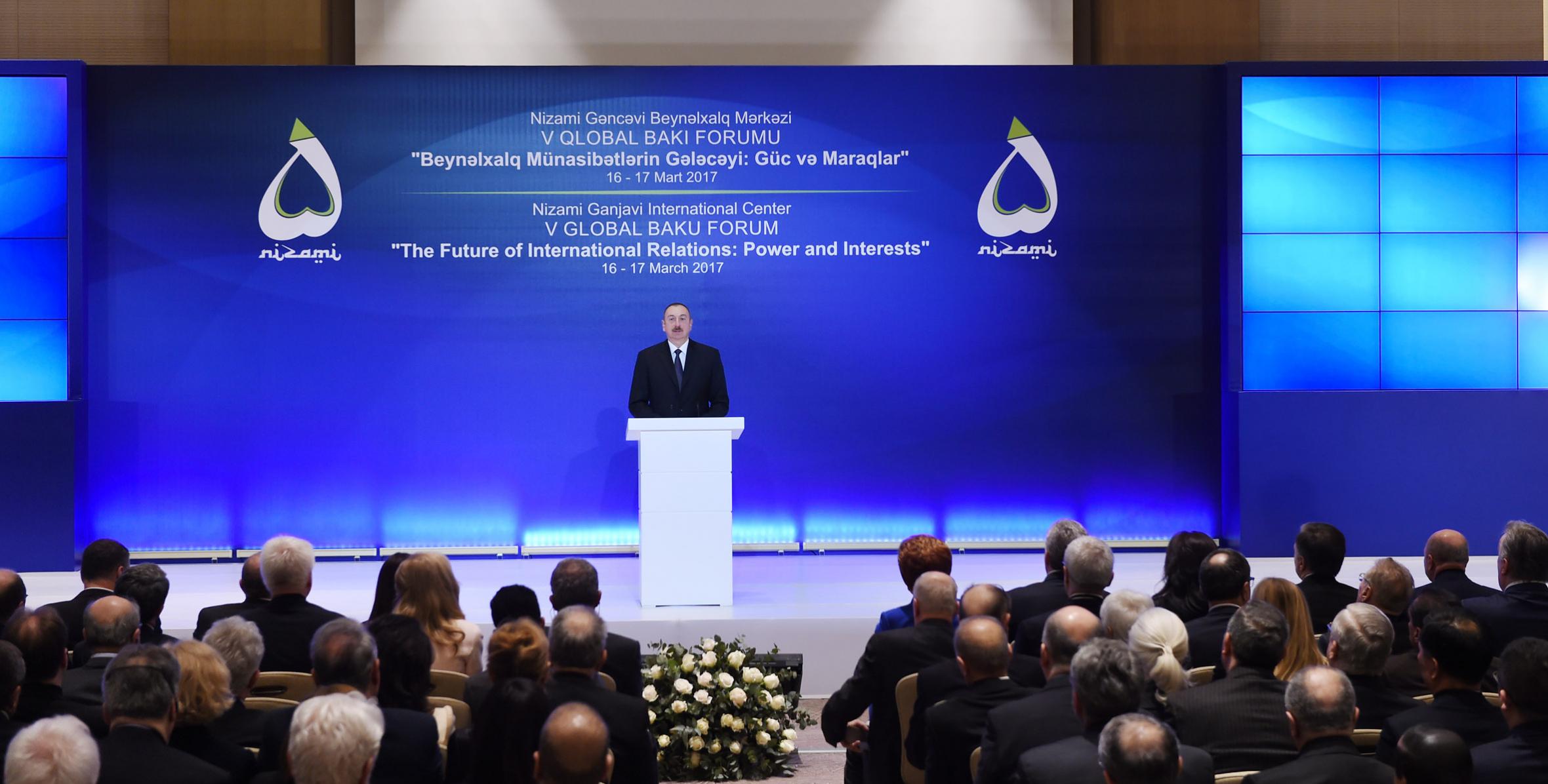
The 5th Global Baku Forum has today kicked off in Baku under the slogan "The Future of Foreign Relations: Power and Interests".
President of the Republic of Azerbaijan Ilham Aliyev and first lady Mehriban Aliyeva attended the opening ceremony of the forum.
Latvian President Raimonds Vējonis, Macedonian President Gjorge Ivanov, Albanian President Bujar Nishani, Montenegrin President Filip Vujanovic, Georgian President Giorgi Margvelashvili, Saudi Arabian Prince, Chairman of the Board of Directors of King Faisal Centre for Research and Islamic Studies Turki Al-Faisal are among the participants of the forum.
Nearly 300 delegates from 56 countries, as well as a number of influential state figures, politicians, experts, and political scientists attend the two-day forum.
The forum is a crucial platform for Azerbaijan to promote its realities, make new friends and strengthen lobbying activity.
The participants of the forum posed together for photographs.
Co-chair of Nizami Ganjavi International Center, Director of the Library of Alexandria Ismail Serageldin declared the forum open.
President of the Republic of Azerbaijan Ilham Aliyev made a speech at the opening ceremony.
Speech of President Ilham Aliyev
Ladies and gentlemen,
Dear friends,
First of all, I would like to express my gratitude to all the participants of the forum for being with us today. The 5th Global Baku Forum already became traditional. We organize this important international event for the fifth time. I would also like to take this opportunity and express gratitude to Nizami Ganjavi International Center, it’s board and co-chairs – Madam Vaira Freiberga and Mr. Serageldin for their outstanding activity and contribution to transforming Nizami Ganjavi International Center into a global international institution, which works very actively and efficiently. And one of the directions of the activity of the center is today’s forum.
I welcome all the participants who represent more than 50 countries. The total number of guests is 260. Every international forum, of course, its importance and future impact on the decision-making process in the world depends on the topics of discussions, and I think, even more than that, on the list of participants. Among our guests we have more than 40 acting and former presidents, vice presidents, prime ministers and parliament speakers.
So, this indicates the high level of our gathering. It already pre-determines interesting discussions and the valuable ideas, which will be available during these days in Baku.
Azerbaijan has already hosted a number of international events. These events are important, first of all, in terms of addressing important issues on the global agenda. At the same time, Azerbaijan as an independent country is relatively young. Only last year we celebrated the 25th anniversary of restoration of our independence. I think our international activity, also regional activity, the projects, which we initiate in our country, which have positive impact on the whole region, is one of the ways to present our country to the world. And, of course, such big international events like the Baku Global Forum is one of these activities.
Since we met last time in Baku, unfortunately, the world has not become safer. We still have protracted conflicts, we still have confrontations, wars in our region. And this, of course, is a very dangerous tendency.
Azerbaijan is playing an important role as a stabilizing factor in the region where it is situated. Our initiatives aim at regional cooperation, predictability, and the strengthening of security measures in our region. But we are not an island. And, of course, situation beyond our borders, with the close neighborhood is of great concern for us.
We still have, as I said before, very serious challenges and wars, conflicts, the migrant crisis. This is a big humanitarian catastrophe. At the same time, the migrant crisis also leads to, I would say, less understanding between different parts of our world because it creates certain discomfort for the people of the countries where the migrants are heading. But this is only the consequence of what happened because the real reason of this crisis is external political and military interference into the internal affairs of these countries.
This migrant crisis was not happening five or ten years ago. It happened recently, just because of that. So, this is a consequence of, I think, not very thoughtful policy towards the countries of the Middle East.
And this in its turn leads to radicalization of societies of the countries where the migrants are heading and as the consequence of that radicalization of the political elite. Therefore, unfortunately, the most attractive slogans in election campaigns are slogans very close to nationalism and anti-migrant sentiments. We witnessed it during last months, years. This is a tendency. Therefore, the tendency, of course, pre-determines the development. I think, one of the most important issues on the global agenda is to reverse this tendency backwards and more towards cooperation, mutual understanding, mutual respect rather than alienation, political confrontation and lack of dialogue of civilizations.
Azerbaijan is a country, whose geography to certain degree predetermines its role in the region. We are investing in the dialogue of civilizations and cultures.
Azerbaijan itself suffered from wars, occupation, humanitarian catastrophe as a result of Armenian aggression and occupation of our territory. This occupation lasts for more than 20 years. Almost 20 per cent of the internationally recognized part of Azerbaijan – Nagorno-Karabakh and seven districts, which surround Nagorno-Karabakh, are under Armenian occupation.
All the infrastructure is destroyed. All our historical and religious monuments are destroyed. The OSCE fact-finding mission sent delegations and groups of observers to the occupied territories and their reports clearly show that all the buildings and historical heritage of Azerbaijan have been destroyed.
This conflict is a result of Armenian aggression against its neighbor. It’s a result of separatism and war against Azerbaijan. And million Azerbaijanis suffered from that. They became refugees, and internally displaced persons. This figure is one of the highest per capita figures in the world.
Today’s population of Azerbaijan is close to ten million, and when the conflict started it was around eight million. One million of eight million in the beginning of the 1990s became homeless. It was a serious political, economic and social issue and crisis for our young country because at that time Azerbaijan was a very poor country – economy was in chaos, there were no clear means of economic development, and plus million people came from the occupied territories and they had to be taken care of.
Since that time, of course, Azerbaijan has developed. And we are capable to provide decent conditions for our compatriots. But the conflict is not resolved. All the important international organizations adopted resolutions and decisions, which demand the withdrawal of occupational Armenian forces from our lands. United Nations Security Council, which is a top body on international arena, adopted four resolutions demanding I quote “immediate and unconditional withdrawal of Armenian troops from the occupied territories”.
But these resolutions remain on paper. Armenia ignores them, and already 25 years have passed since that time. So, this also shows the lack of mechanisms of implementation of the decisions of international organizations, particularly UN Security Council on the one hand. On the other hand, it shows again the lack of consistency because we all know that in some cases resolutions of Security Council are implemented within days, if not hours. But in our case it takes 25 years, and still there is no progress. Our refugees, internally displaced persons still cannot go back to their native lands.
We consider this the policy of double standards. In general, I think the recent developments in the world show that the policy of double standards, unfortunately, becomes kind of a standard in international relations and the norms and principles of international law are being interpreted by different countries with respect to their preferences and current political interests.
I think this is an important issue when we are talking about the reform of United Nations, and in general, implementation of decisions of international organizations.
If the decisions are adopted but not implemented, of course, not only the countries, which suffer, will suffer more, but the world will be in danger because that means that any country can use its force in order to change situation on hand, in order to occupy territories, in order to cause sufferings to millions of people and not to be punished.
Therefore, we have raised many times the issue in front of international organizations, and in front of countries that for this aggression, occupation and war crimes, which Armenia committed against peaceful Azerbaijani citizens, Armenia must be sanctioned. Then, it will be fair. Then, it will be a single standard.
In one case countries are sanctioned, in other case they are not. The conflict resolution must be based on international law, and territorial integrity of Azerbaijan must be restored. Our people must have the right to return to their homelands.
This is a danger for the region. Unresolved Armenia-Azerbaijan conflict possesses permanent danger to stability and peace. We want to resolve this conflict peacefully, but we want to resolve it. Armenia wants to keep the status quo unchanged and ignores the strong statements of the mediators, which are three permanent members of Security Council – France, Russia and United States – whose leaders on many occasions have said that status quo is not acceptable, and status quo must be changed. And change of status quo means the beginning of de-occupation of the territory of Azerbaijan.
Despite this heavy burden and humanitarian crisis Azerbaijan’s development has been rapid and sustainable. We have big achievements in economic transformation of our country. I think that 25 years of freedom, 25 years of independence demonstrate that the people of Azerbaijan are not only capable to live as an independent nation and to build their future, but also they are capable to achieve success in many areas. If you look at the economic performance of Azerbaijan, especially in the recent years, you will see that our achievements in economic area really demonstrate that when you have a strong political will, consolidated society, when you have unity between the government and the people you can achieve a lot even with the conflict, even with occupation, even with not an easy geopolitical environment.
Our economy demonstrates sustainable development. We have a very low foreign debt, which is only 20 per cent of our GDP, which is a little bit unusual for today’s world. In other words, we always try to spend less than we earn. Our currency reserves are five times bigger than our foreign debt.
Therefore, Azerbaijan can attract a lot of financing for different projects, but we try mainly to use our own resources in order not to increase the level of foreign debt, though its low. But the target is to reduce it.
Due to a broad regional development program, we managed to reduce poverty ten times within last 14 years, and now it’s less than six per cent. Unemployment is around five per cent. Though, of course, Azerbaijan’s economy suffered from the collapse of the oil prices. But at the same time, this situation forced us to be more active on economic reforms. And within a very short period of time we managed to overcome difficulties.
Just imagine that your revenues drop three-four times. It’s a serious challenge for any country, for any family. So, the countries and the people are used to certain lifestyle, certain level of development. And then all of a sudden your revenues collapse and drop four times. This was a really serious challenge for our government. But I said that we managed to overcome it, though, there were difficulties and still they continue.
In general, the period of adaptation to low oil prices, I think, already happened. And 2017 is the year of economic growth. Even last year when we for the first time in 14 years had economic recession, if you look at the parameters, which are not linked to oil and gas, you will see development.
Our non-oil industry grew five per cent, agriculture more than two per cent last year. In the first two months of this year, we had the same performance in non-oil industry and had a growth of more than three per cent in agriculture. GDP started to grow and we managed to increase our non-oil export around 50 per cent in two months of this year.
Therefore, diversification of economy, this policy was conducted for many years, and already brings results. Now the main objective for the coming years is diversification of our exports. We need new markets, and, of course, to enter new markets we need to have very good political relations with the countries, whose markets are attractive for us.
On a foreign policy track, Azerbaijan has a strong position in the region and in the world. The international community respects us because we pursue an independent policy and also we always keep our word. In other words, we are a reliable partner, and we managed to build very positive, at the same time, pragmatic relations with our neighbors, which are based on history, friendship and mutual interests and mutual respect, and non-interference into internal affairs of each other.
Regional cooperation and our relations with all our neighbors are of extreme importance to us, to any country. If a country has a problem with its neighbor, both countries suffer.
Therefore, apart from Armenian aggression, with all our neighbors we have very good relations and we implement a lot of projects – energy, transportation, trade, cultural projects – which bring our peoples closer.
We established very good relations with member countries of European Union. With nine of them, this is one third of the member states, Azerbaijan signed or adopted strategic partnership documents. I think this is also a big achievement because this shows that many European countries treat Azerbaijan as a strategic partner and not only because of energy resources. Our cooperation is much broader. Last month we launched negotiations with European Commission on a new agreement, which will be a partnership agreement and which will cover many areas of our activity.
This policy sometimes is called balanced. I don’t know maybe that’s a proper word, but I think it’s a policy based on national interests of our country. National interests dictate us that we must build relations based on national interests, based on realistic approach. We should not put in front of us unrealistic targets and then be disappointed, frustrated when these targets are not met.
The same can be applied to our relations with European Union. We put realistic targets and during the discussions now we see that our counterparts also prefer to treat Azerbaijan from a realistic point of view.
Instead of signing an association agreement with European Union, which frankly speaking, was not an agreement that could produce some tangible results, we preferred to go on a separate track and prepare an agreement on partnership. Now maybe it can be called strategic partnership, which will be balanced, mutually beneficial and with practical results.
Policy without results is populism. And we don’t have time to waste on that. We base our policy on the real situation. Sometimes we try to change situation, and we managed to do it. Azerbaijan plays also a stabilizing role in the communication between some countries, which sometimes have problems.
It happened during the recent history, when our neighbors had misunderstanding, when there were clashes. We always tried to play our role. And due to the fact that Azerbaijan is considered to be a really independent country with its policy, we had success.
I would also like to mention one event, which took place last month here in Baku. For the first time the representatives of military command of the new American administration and Russia, chiefs of staff of both countries` armies met in Baku.
Selection of Azerbaijan for this meeting, of course, was not our initiative. We were approached by both sides. Selection of Azerbaijan actually is another demonstration of what I am saying now – Azerbaijan is considered as a reliable partner, which is respected by big powers, and whose independent policy is already a reality. This is appreciated because it is always better to have a predictable partner rather than a kind of satellite. We have satellites nearby and that does not lead to success or respect.
So, in the future, with respect to the foreign policy, it will be based on pragmatism, our national interests, our security. We were very active in the fight against terrorism. Azerbaijan has been a reliable partner in the peacekeeping operations in Afghanistan since 2001. Since the very beginning we have kept our troops there.
We provide very important transportation network, which is called northern distribution network, and provide all flights for NATO operations. This is a serious contribution to the peacekeeping efforts. At the same time, Azerbaijan is one of the few countries non-members of NATO, which provide serious military and economic assistance to the government of Afghanistan. Talking about distribution, of course, I also want to inform you about the recent developments in the transportation sector, which also is not our internal issue because the projects, which were initiated here in our region, today are growing and becoming global.
With our partners, with Georgia and Turkey, we initiated the construction of the railroad, which connects three countries and actually, connects continents. We can increase trade without having this railroad connection. This railroad connection is needed in order to connect Asia with Europe through the shortest transportation route. It is not the cheapest. We are working in order to reduce the tariff, but this is the shortest route. The companies, which prefer to send cargo in a short period of time, definitely will use this transportation network.
East-West corridor is a corridor of cooperation and business. It already generates thousands of jobs in Azerbaijan and in the neighboring countries and will generate a lot of profit for our country, and, of course, our role as a transitor will grow.
This project was inspired by energy diversification projects, which we started to implement with our Georgian and Turkish neighbors. Now it is growing. Whether it`s an oil pipeline or a gas pipeline, we have already many countries involved in this process. First, it was an oil pipeline connecting Azerbaijan with Black Sea ports, then with Mediterranean port. Now it’s time for gas distribution infrastructure to be successfully implemented. Seven countries – Azerbaijan, Georgia, Turkey, Greece, Bulgaria, Italy, Albania – are already members of the Southern Gas Corridor and three Balkan countries – Croatia, Montenegro and Bosnia Herzegovina – are our partners for the next stage of the development of this project.
This is really a project of the 21st century, a 40 billion project initiated by Azerbaijan and supported by our partners, by European commission, and which is being successfully implemented. Even at the time of low oil prices for the last two years, still there has not been delay from the point of view of payment of our share in order to implement this project, which is an integrated system of three pipelines stretching from Baku to Italian coast, and investments in a huge gas field in the Caspian Sea.
This is contribution to energy security. At the same time, this is contribution to regional cooperation. So, these countries, which are members of the Southern Gas Corridor, already became natural long-term partners and friends. So we managed to transform positive regional cooperation here in the Caucasus and Turkey towards Europe, European Union. This creates a very unique format of cooperation. Already three times we gather every February or January here in Baku for the Advisory Council of the Southern Gas Corridor, which took place this year again. The declaration, which was adopted by all the members of that council, once again shows the leading role of Azerbaijan.
We initiated these projects. We invite neighbors and partners and receive good results. None of the projects, which we initiated, neither in economy, energy or transportation areas failed. The reason is that all of them were based on a realistic approach. None of them was just for the sake of making noise or praising ourselves or using populist ideas to demonstrate our potential.
Our potential is much bigger than what is demonstrated today. We are not trying to present Azerbaijan on every corner. We are just doing our homework. And life and time shows that we made a right choice.
The last issue I would like to mention today is our investments in the intercultural dialogue. Here we have representatives of almost all continents, 56 countries. This is more than a quarter of members of the United Nations.
In a two months` time, Azerbaijan will host the 4th World Forum on Intercultural Dialogue. It is also already traditional and it is also co-sponsored by such organizations like UNESCO, ISESCO, Council of Europe, World Tourism Organization, United Nations Alliance of Civilizations. So it’s a global event, and I would say a unique event, which addresses the issues of intercultural and interreligious dialogue in the world.
Why Azerbaijan was selected? Not only because we initiated that, but because of our role as a bridge between civilizations and religions. Religious tolerance and the spirit of multiculturalism in Azerbaijan already makes us the center of these positive events.
We attach very big importance to this forum and to this movement because this is what the world needs today. As I said in the beginning of my comments, unfortunately, we talk about dialogue, but we see alienation, we talk about tolerance, but we see hatred, which is growing, which is a danger for all of us and for those in whose countries it happened, for those who suffer physically from that.
Therefore, the role of Azerbaijan as a cultural bridge is important. At the same time, today’s positive, sustainable, safe, stable development of our country shows that only in the atmosphere of mutual respect, multiculturalism, respect for traditions, religion and roots of others, you can achieve success.
Azerbaijan is a multi-confessional and multi-ethnic country and this is our big asset. We demonstrate that only this is the way to develop. To isolate yourself, to cultivate hatred or any kind of superiority will be like a boomerang and hit those who do this.
I would like once again to express gratitude to you for being with us and wish the forum success.
Thank you.
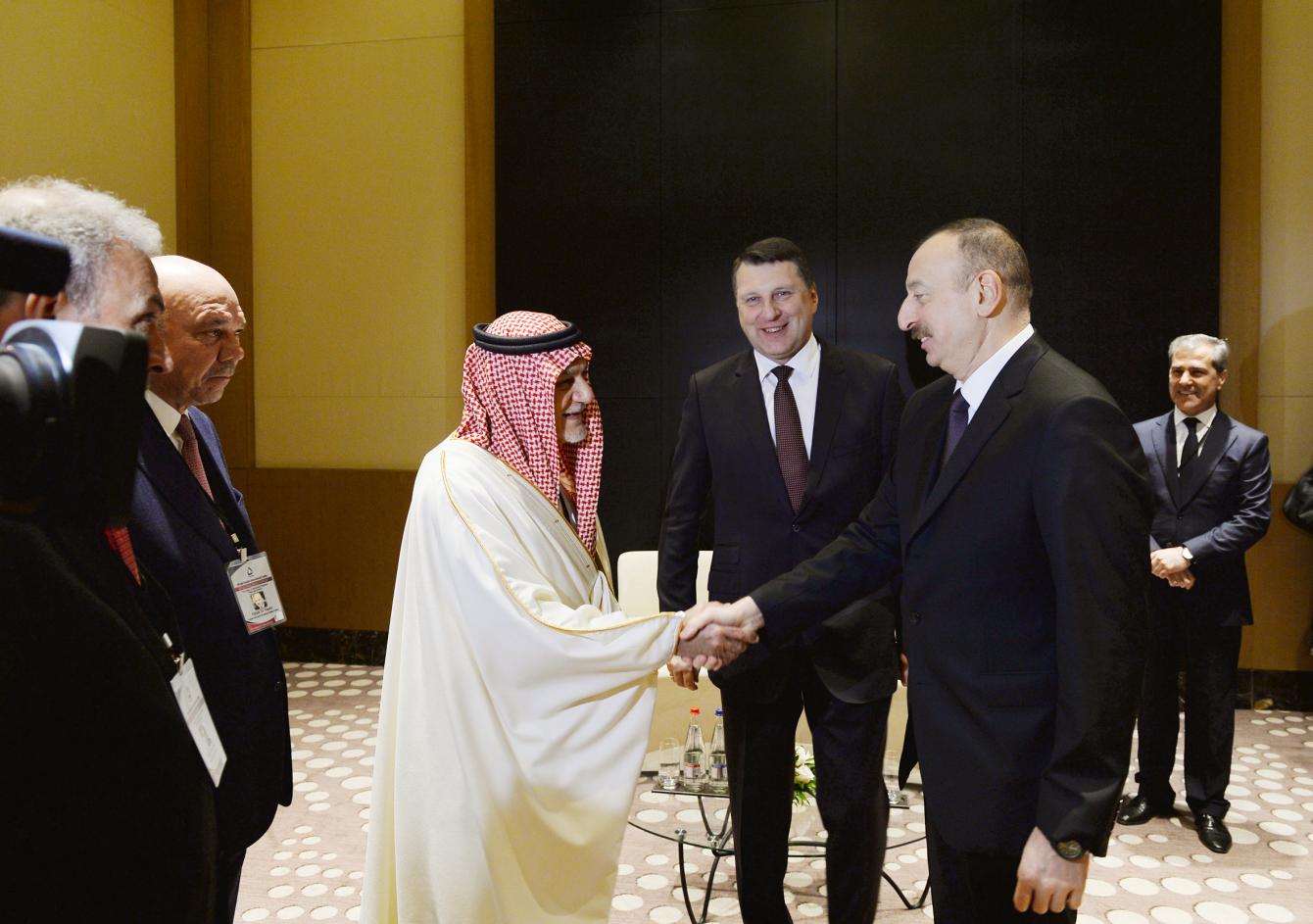
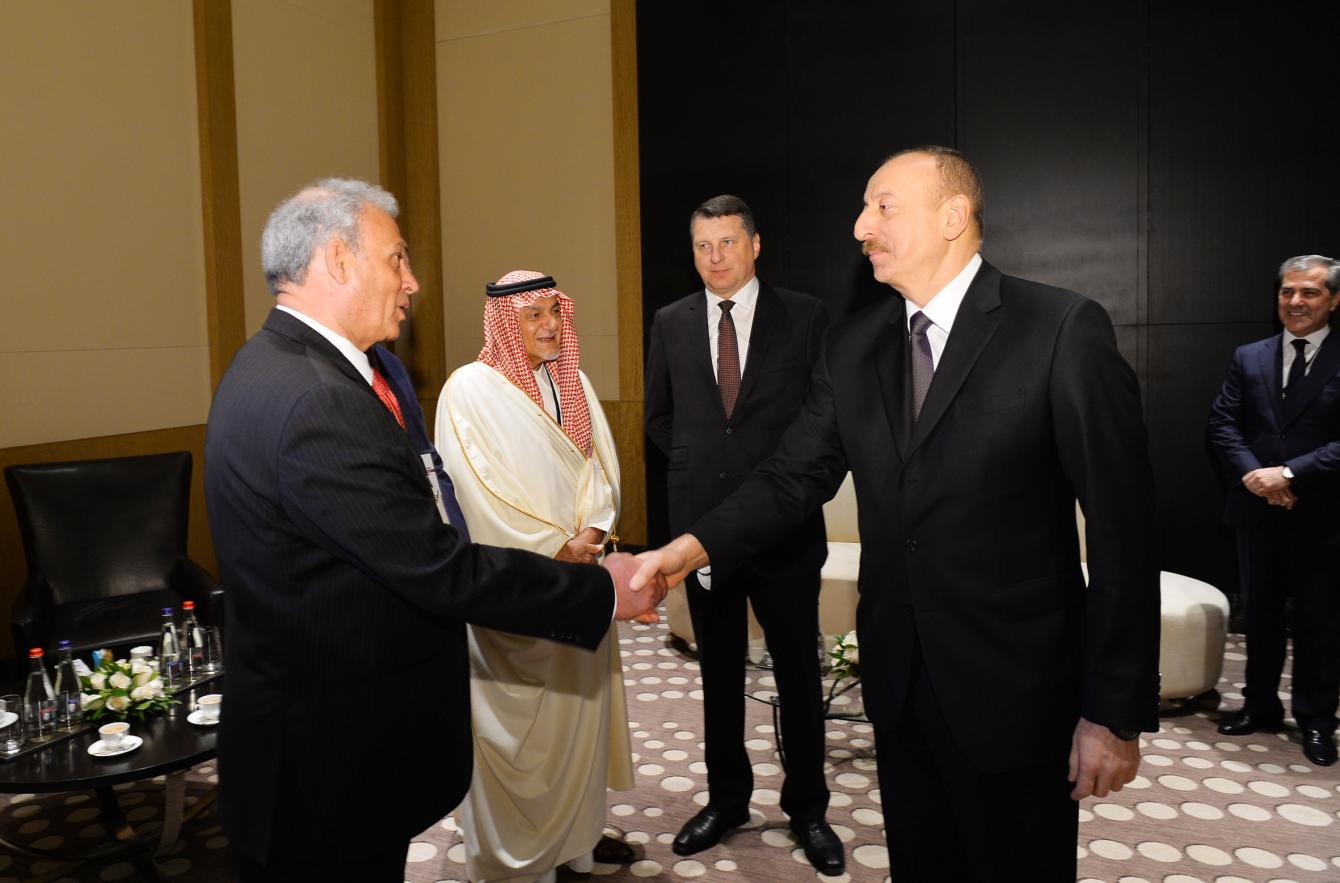
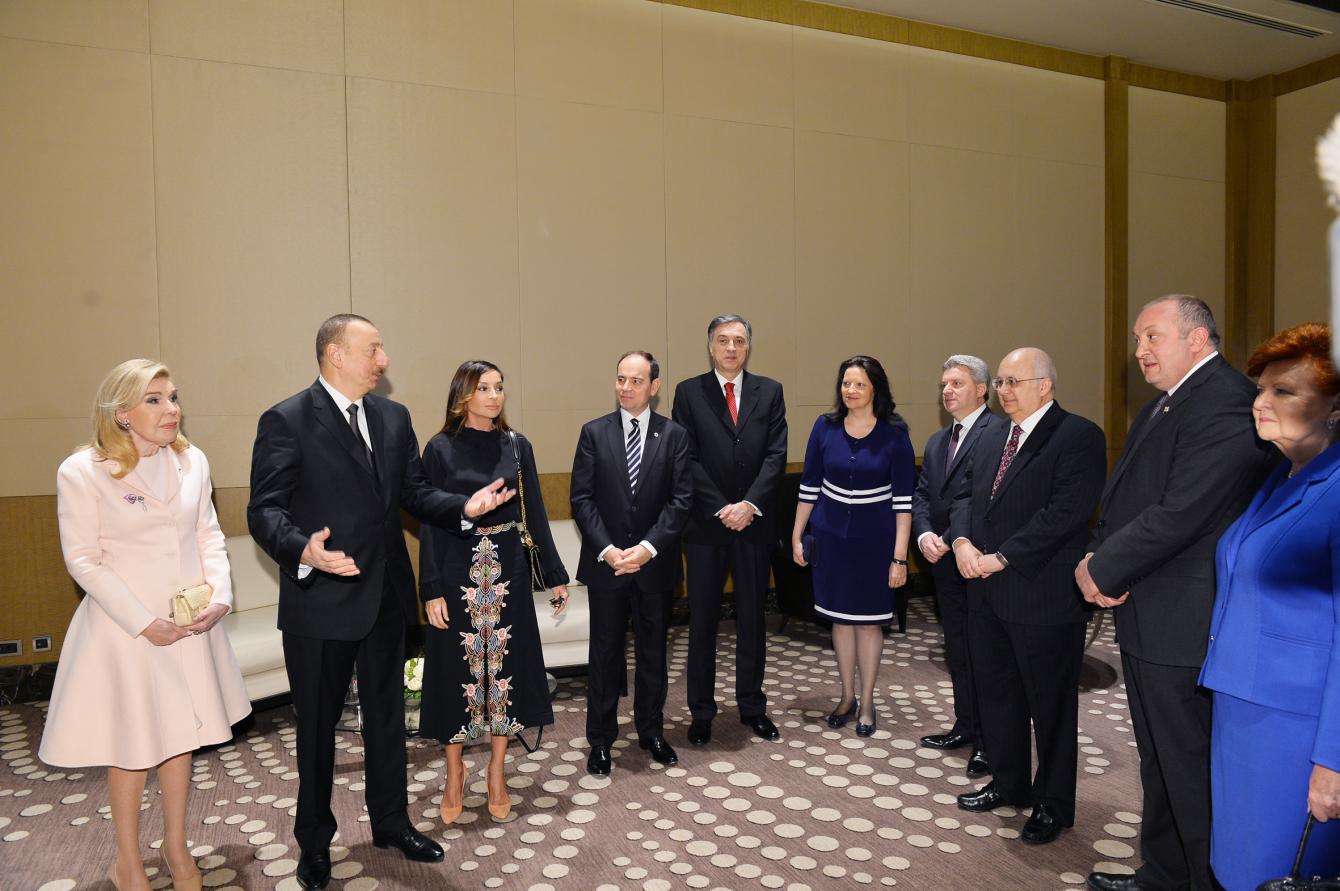
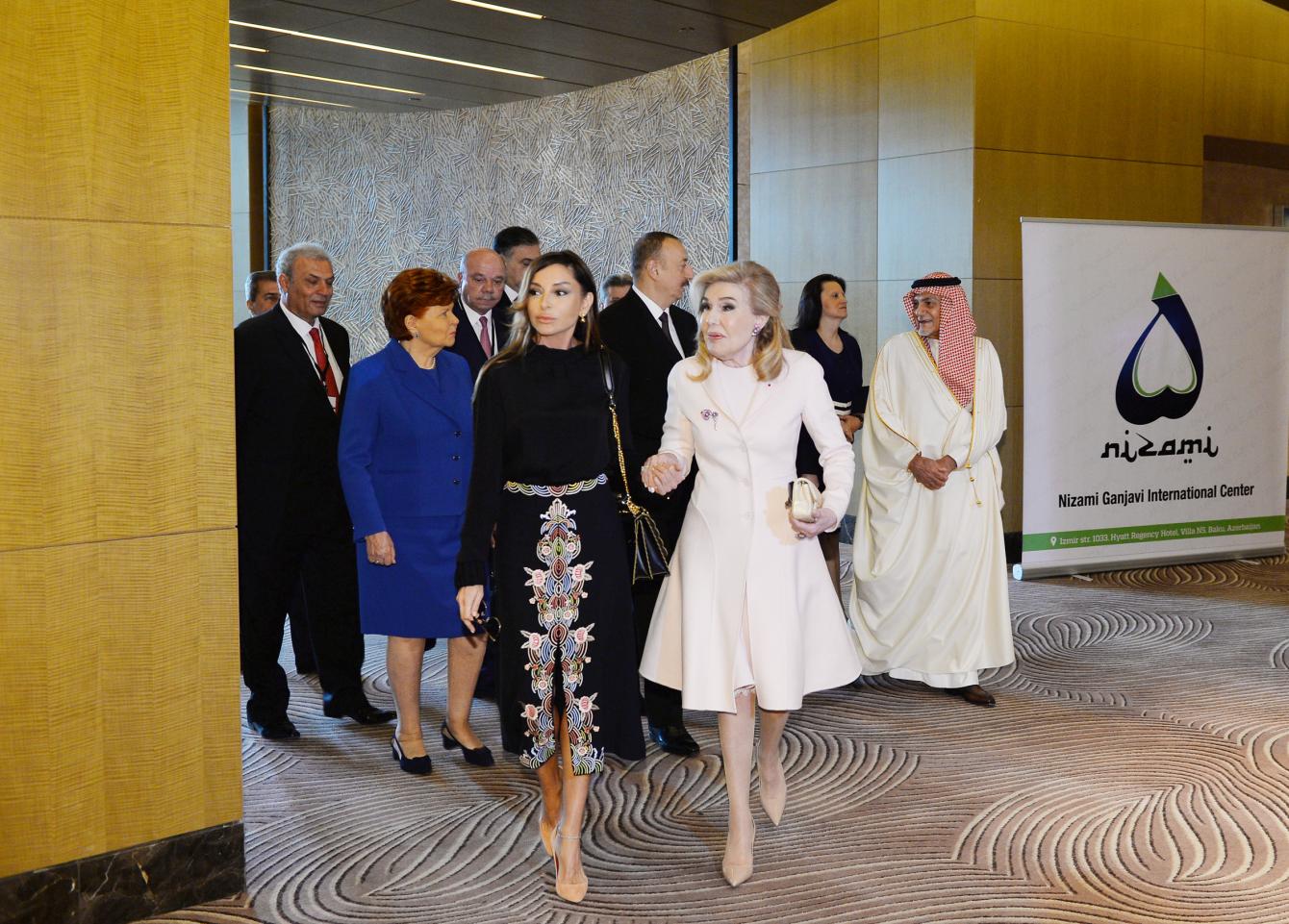
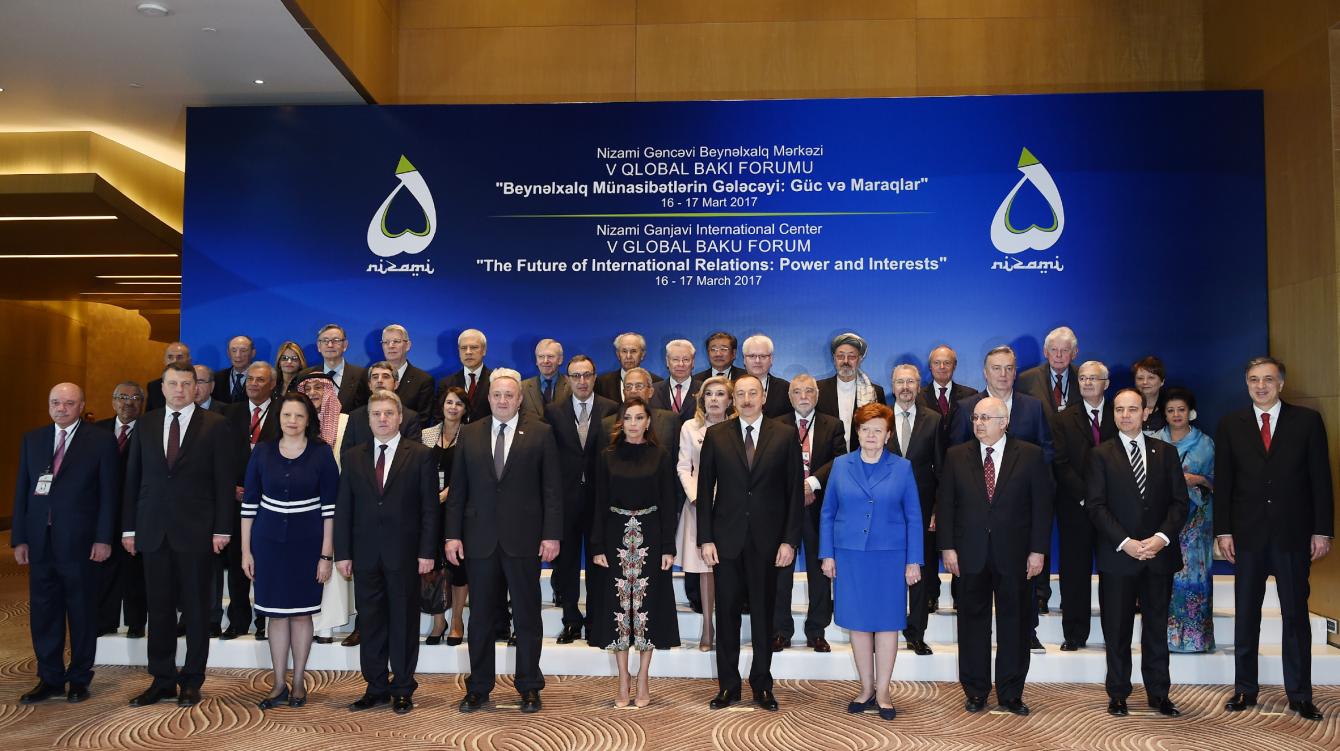
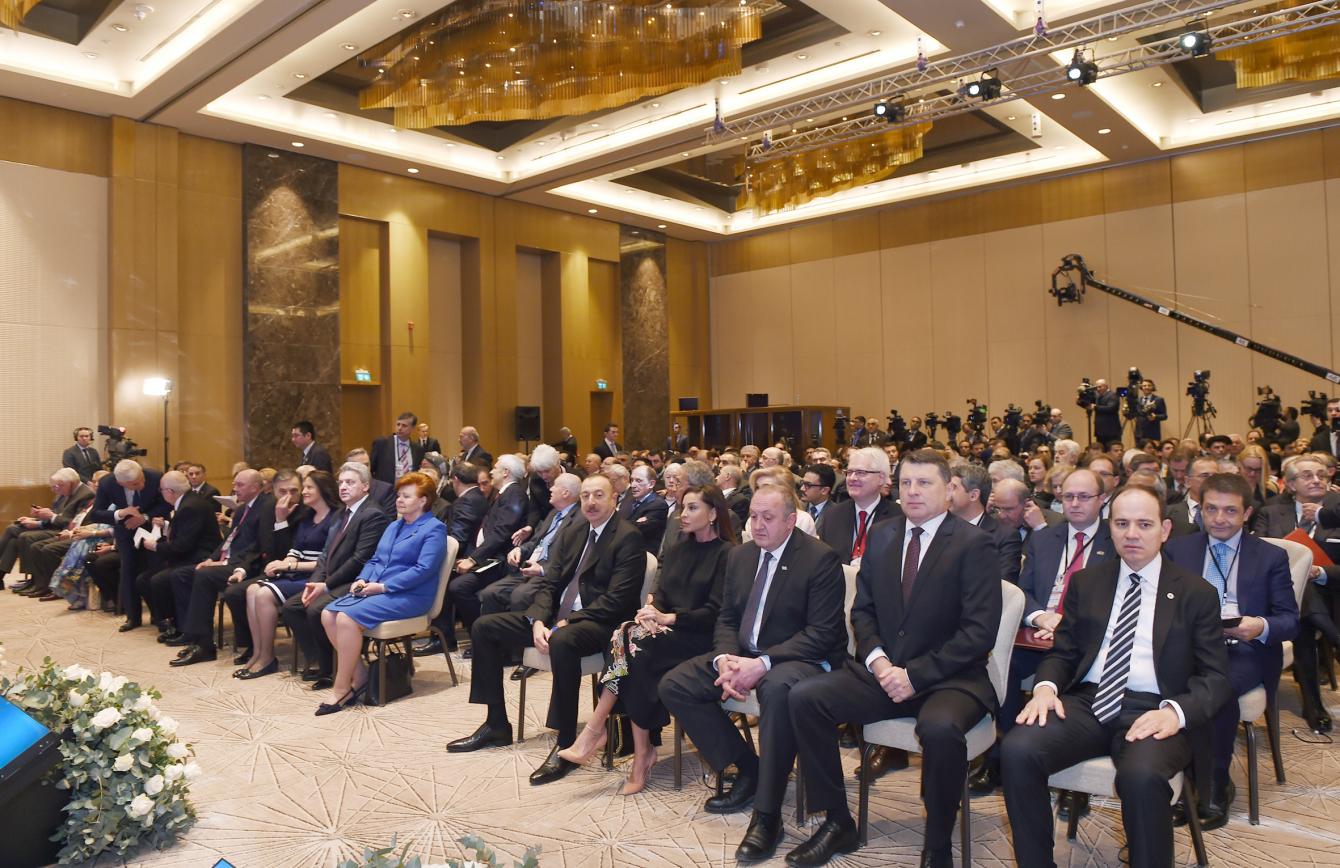
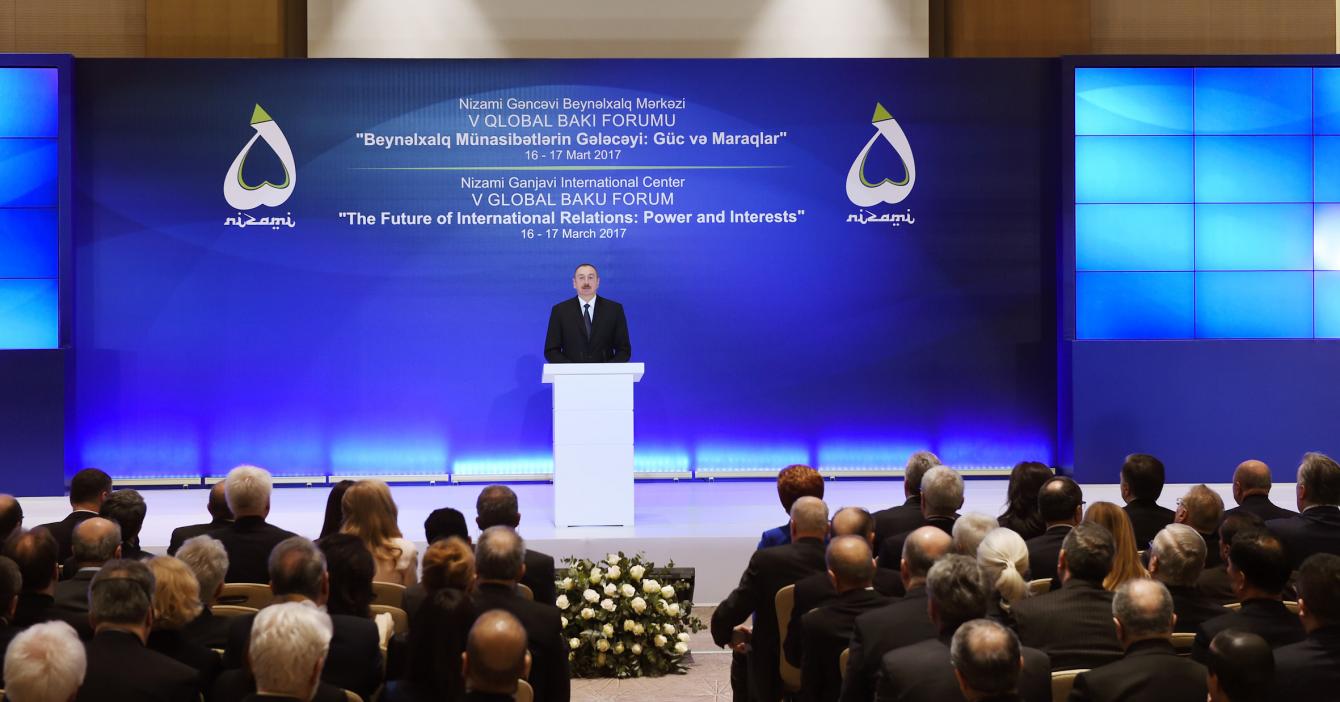
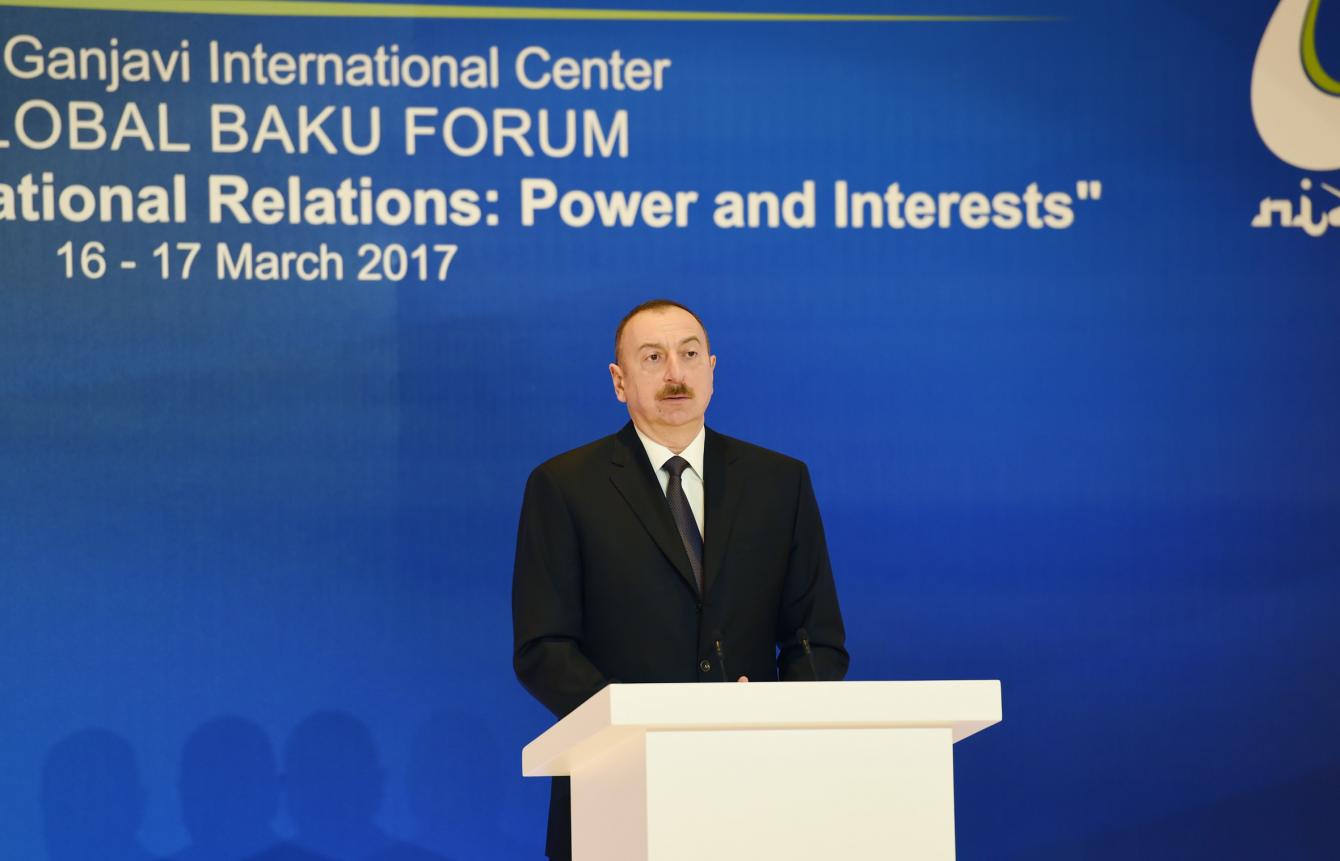
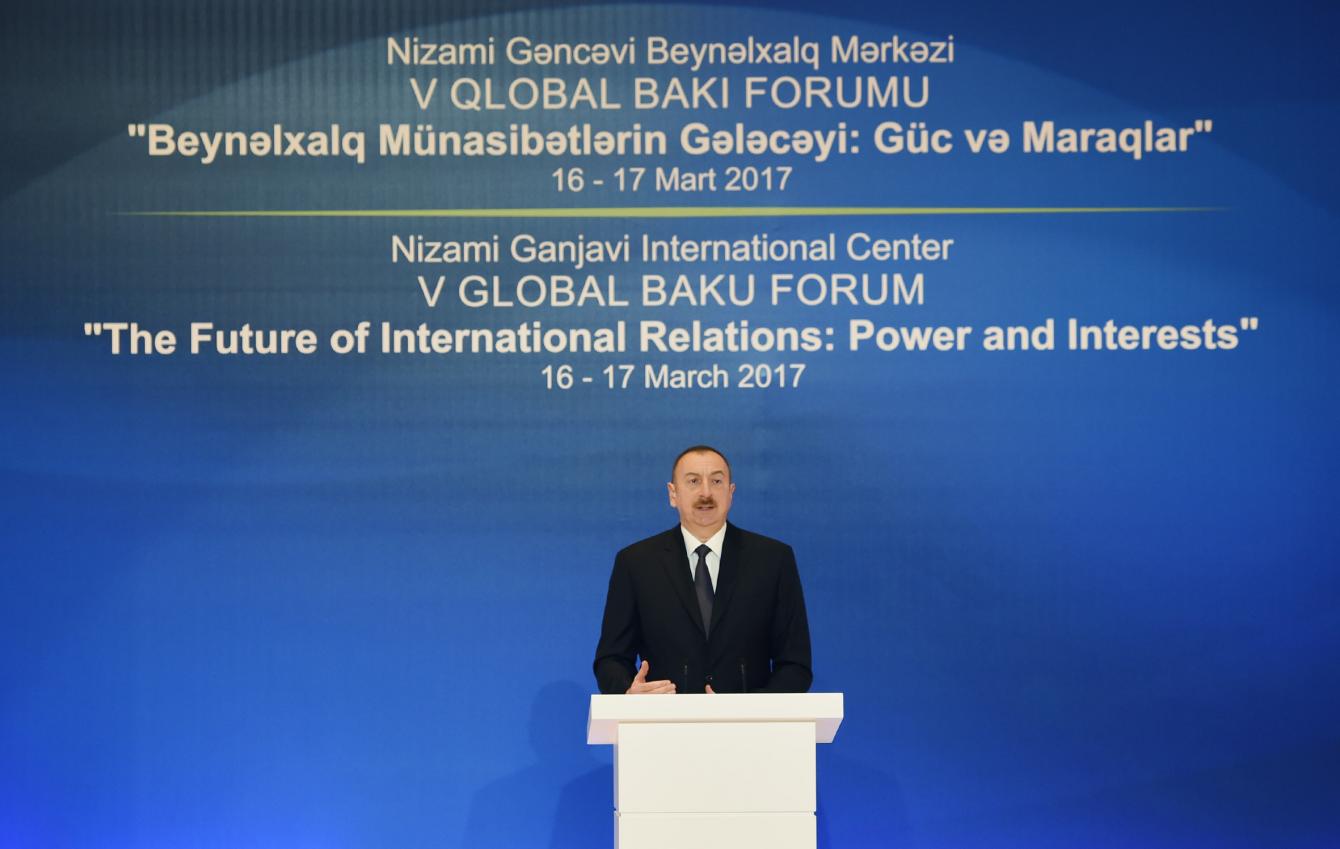
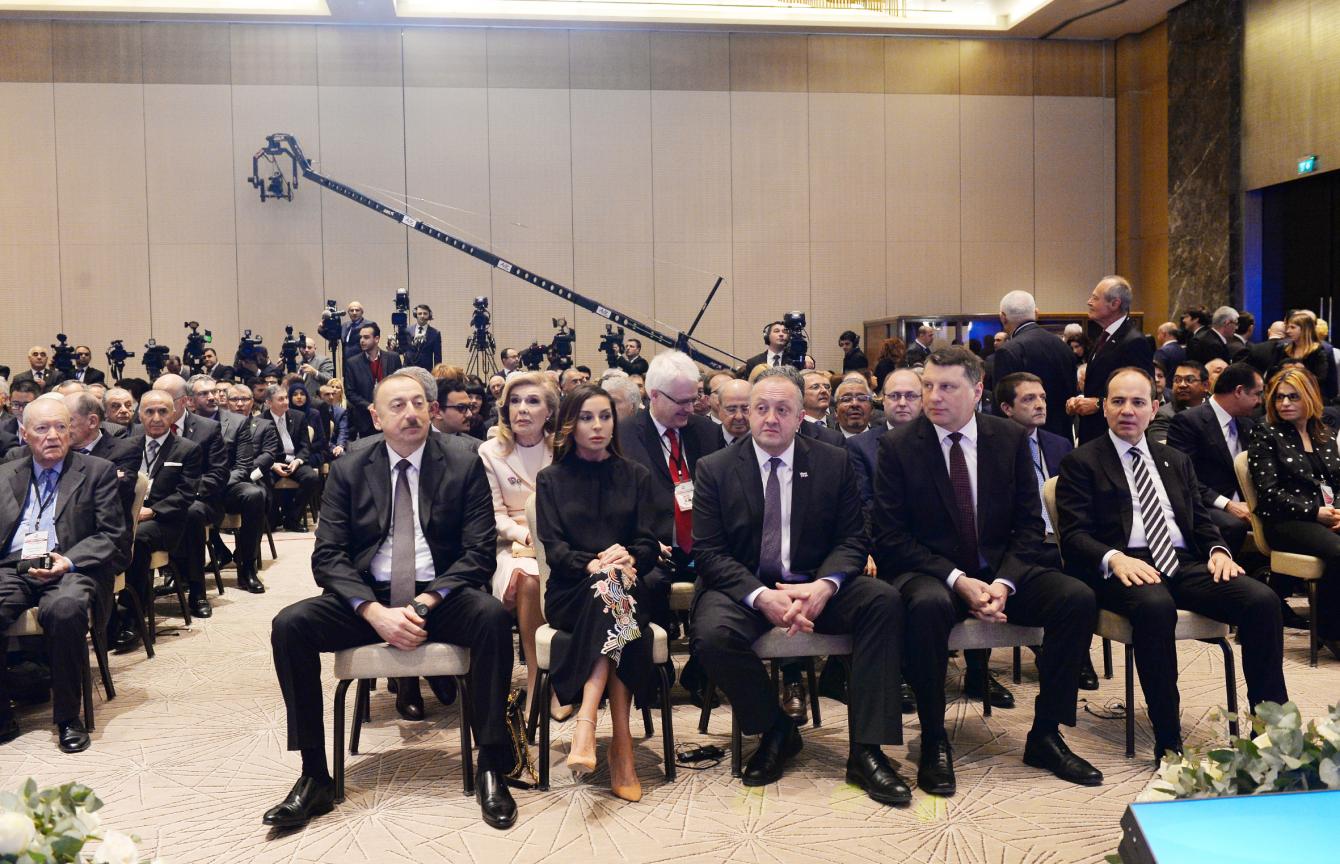
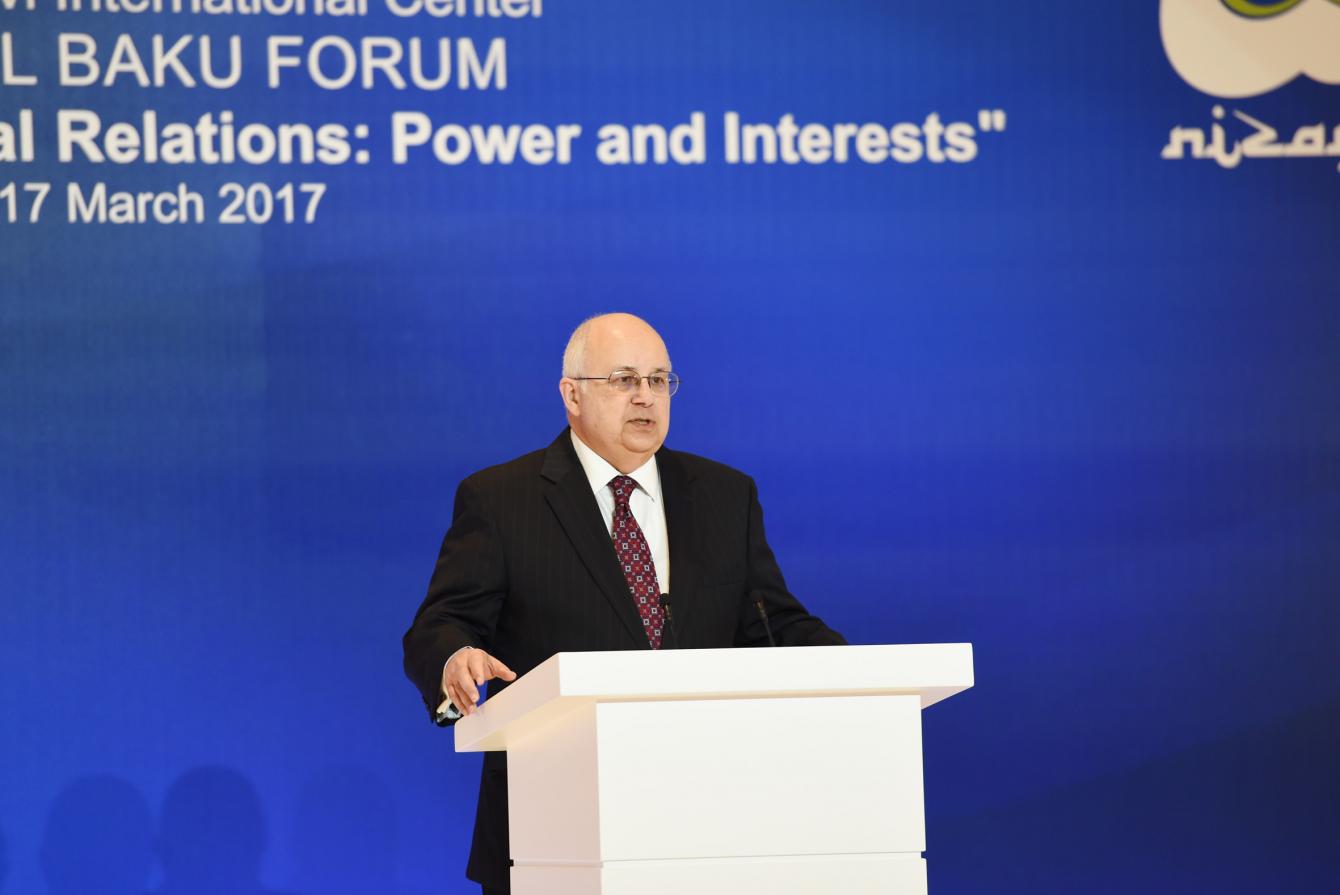
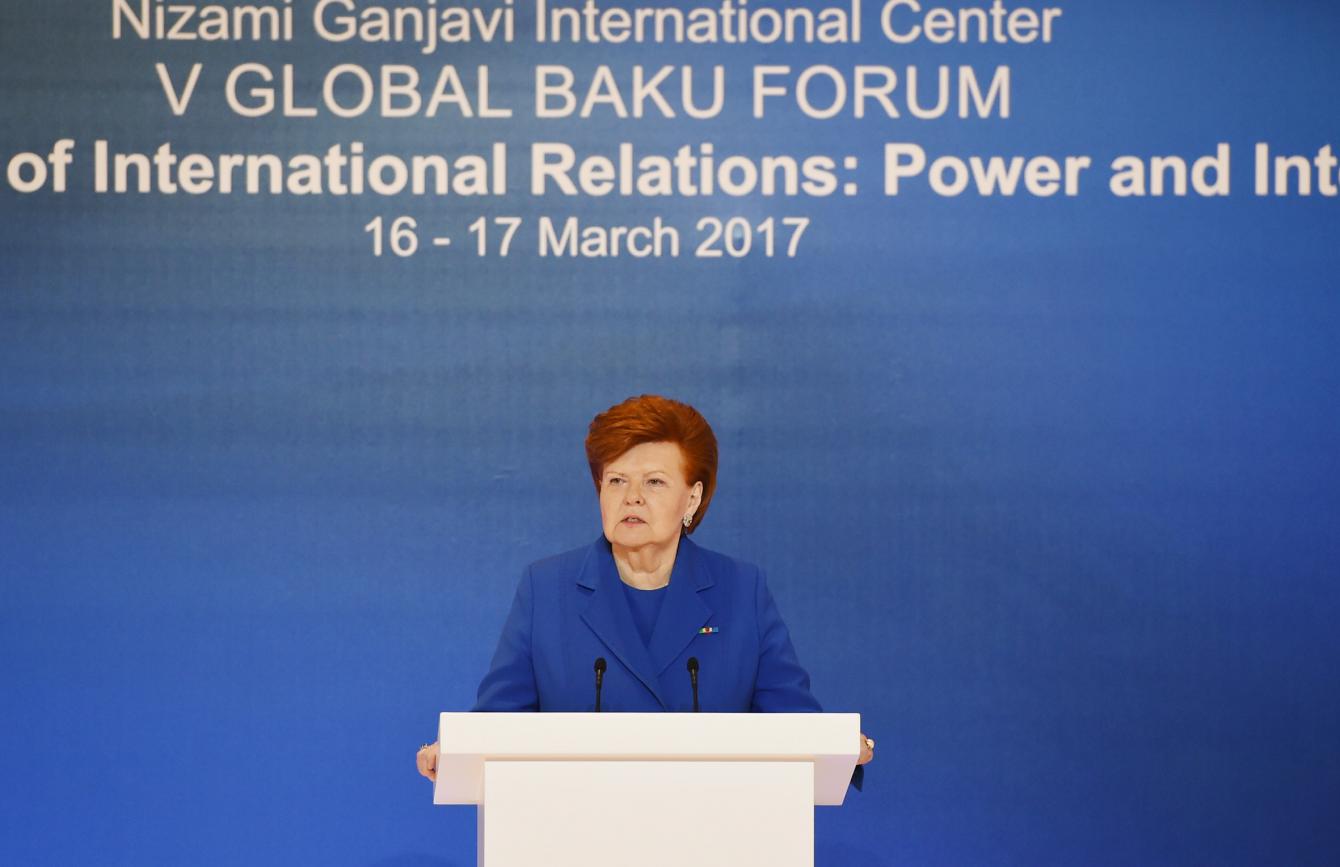
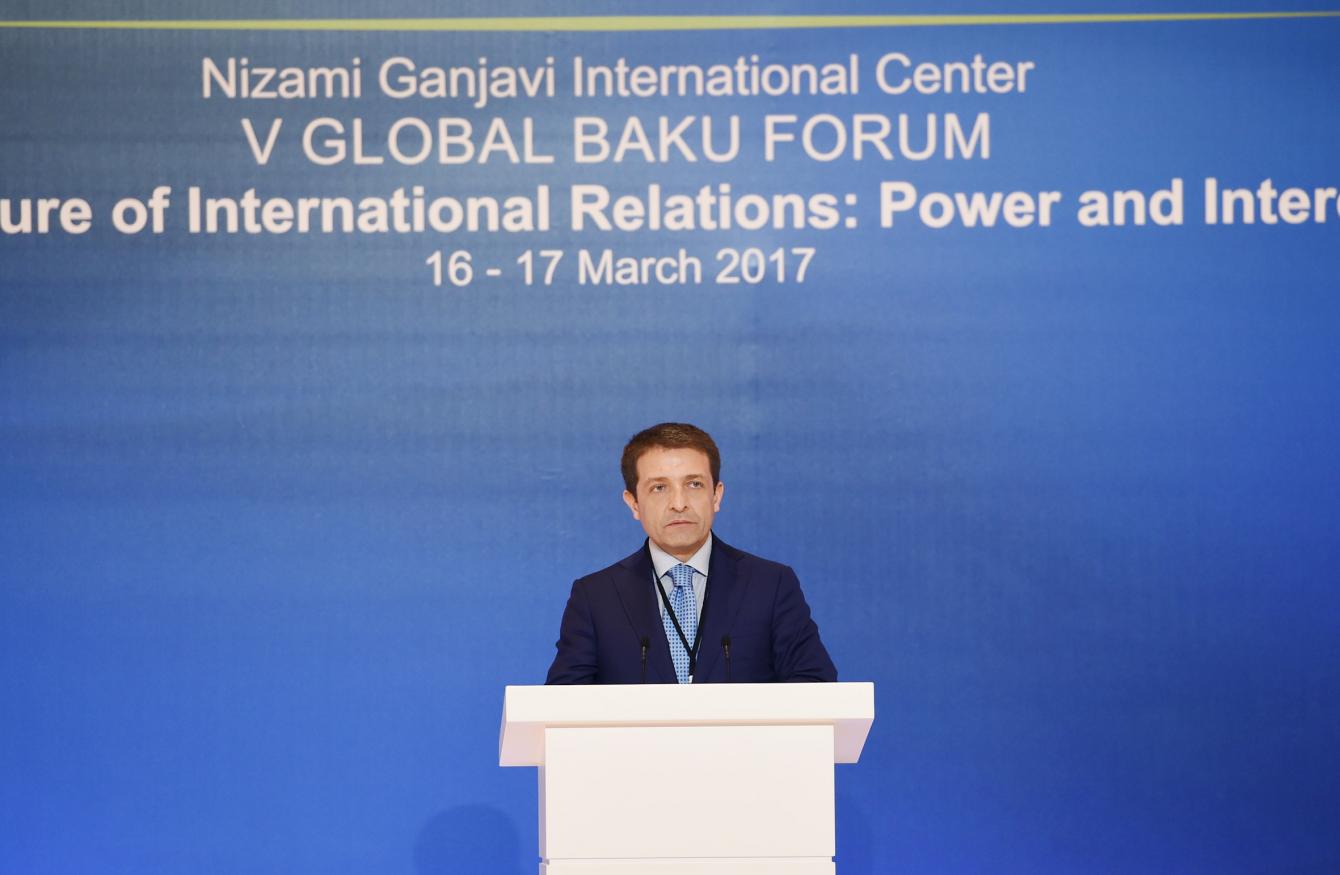
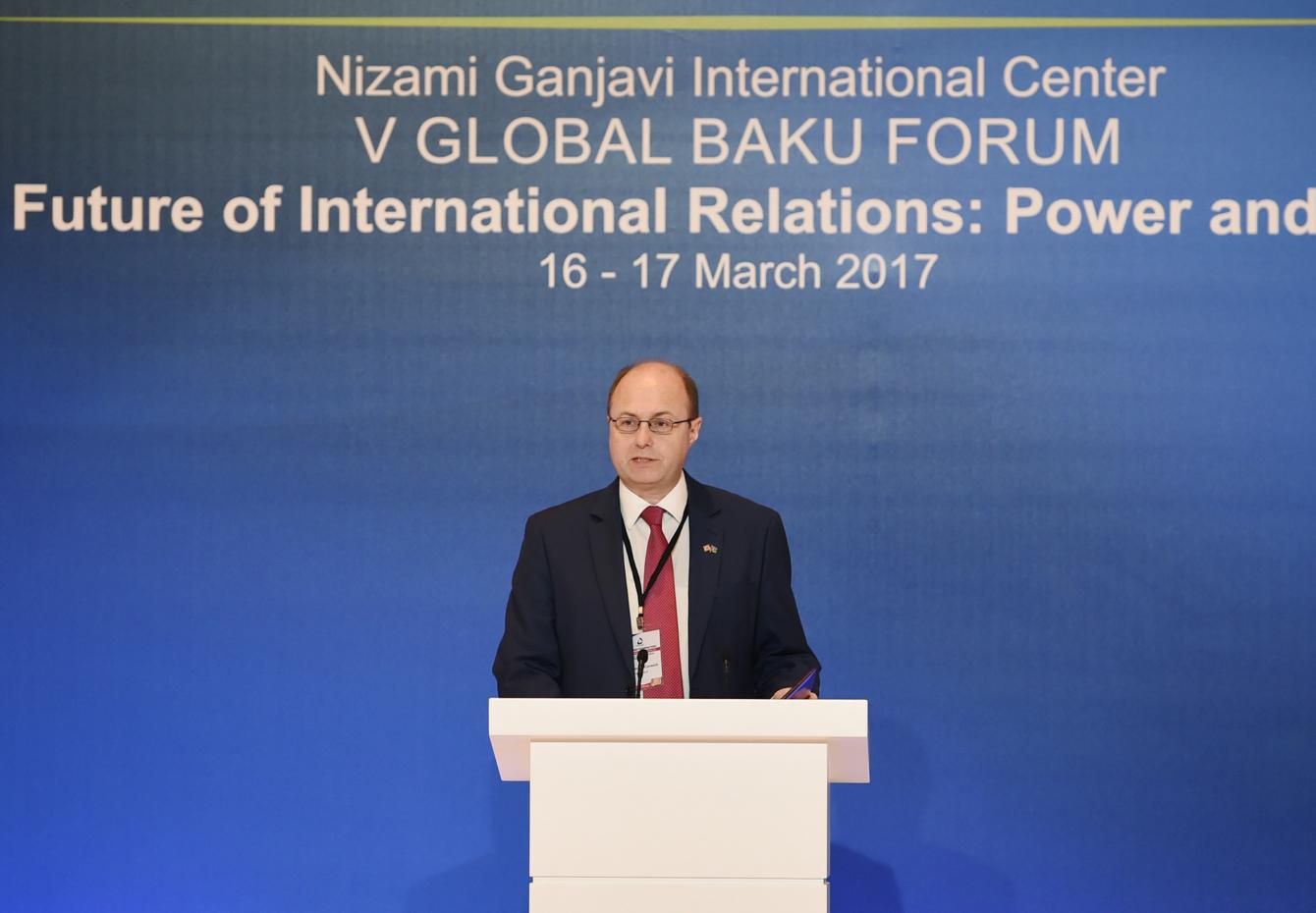

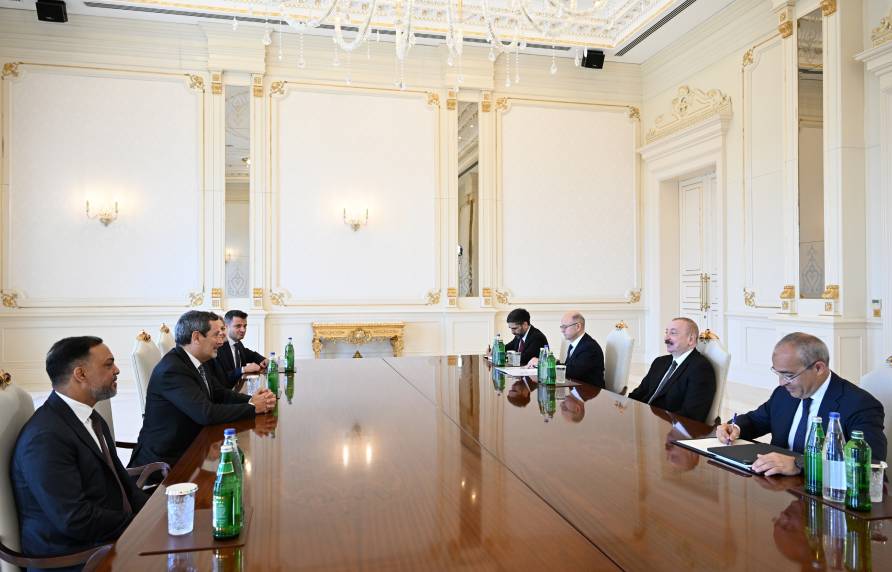
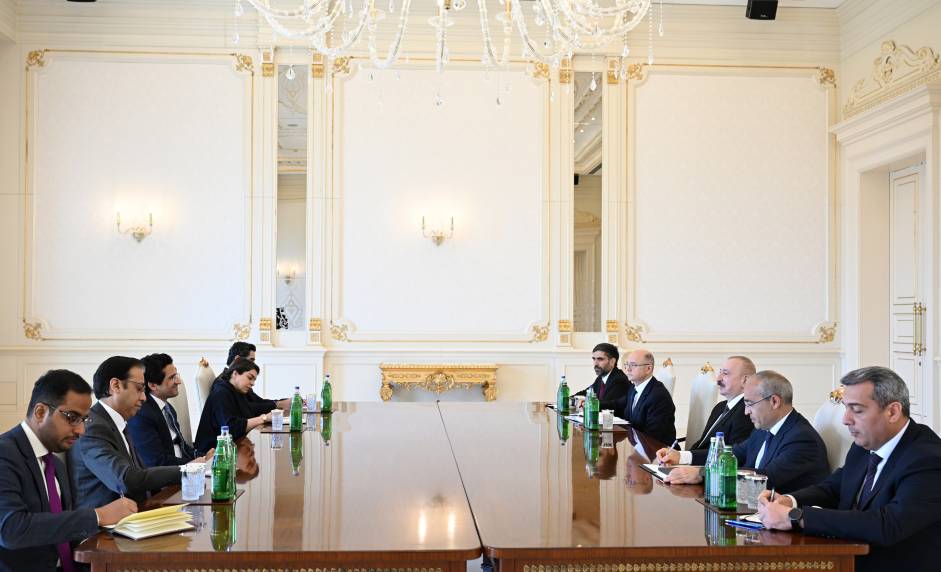
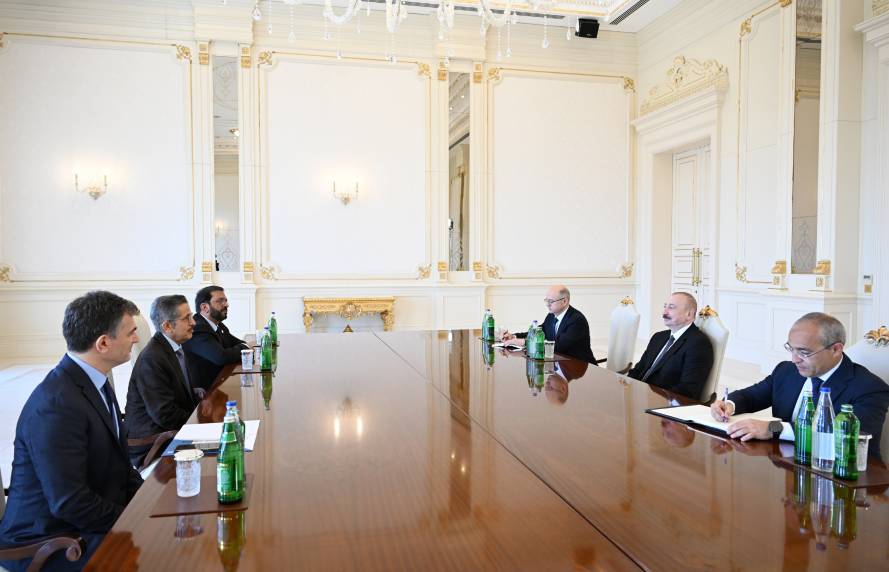
Dear participants of the event,
Distinguished guests, ladies and gentlemen,
Very warm greetings on the start of the Baku Energy Week.
This significant event serves as an important platform for the presentation of our achievements in the energy sector and the...
02 June 2025, 11:57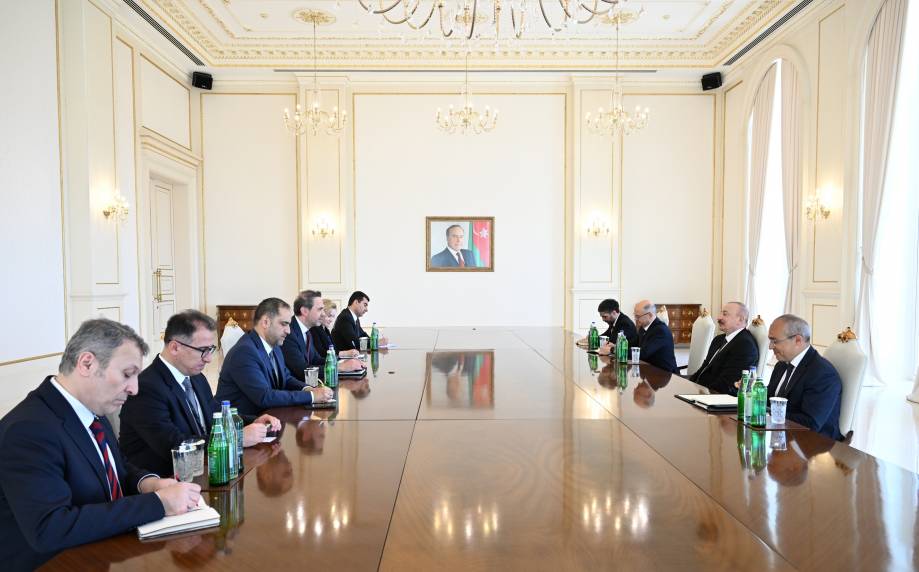
Dear Mr. President,
On behalf of myself and the people of Azerbaijan, I sincerely congratulate you and, through you, the friendly people of your country on the occasion of June 2 - the Republic Day - extending my best wishes.
We are pleased with the dynamic and...
02 June 2025, 11:07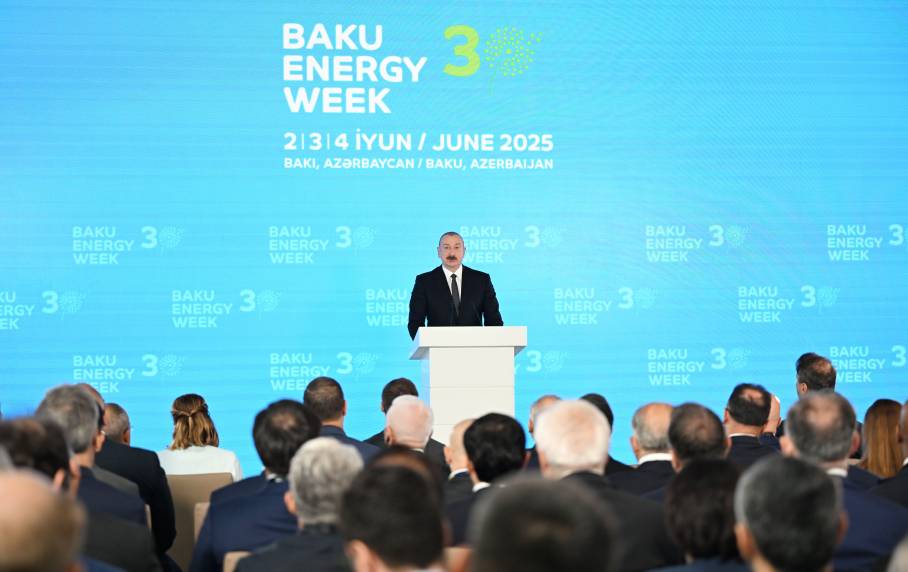
His Excellency Mr. Ilham Aliyev, President of the Republic of Azerbaijan
Your Excellency,
On behalf of the state and the people of Vietnam, allow me to extend my warmest wishes to you on the 107th anniversary of Independence Day of the Republic of Azerbaijan.
As a...
30 May 2025, 19:18On May 30, Ilham Aliyev, President of the Republic of Azerbaijan, made a phone call to Sheikh Mohamed bin Zayed Al Nahyan, President of the United Arab Emirates.
During the telephone conversation, both Presidents expressed their satisfaction with the development of...
30 May 2025, 19:12His Excellency Mr. Ilham Aliyev, President of the Republic of Azerbaijan
Your Excellency,
On the occasion of the Independence Day of the Republic of Azerbaijan, I am pleased to extend my heartfelt congratulations to you and the people of Azerbaijan.
Please accept my...
30 May 2025, 13:29